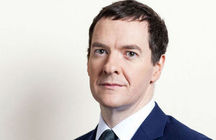Born Gideon Osborne, George Osborne currently holds the position of Chancellor of the Exchequer.
Educated at Norland Place, Colet Court, and St Paul’s School, before moving into Higher Education, reading Modern History at Magdelene College, Oxford, where he graduated with a 2:1 in 1993.
Initially pursuing a career in Journalism, working for the Daily Telegraph, before being advised of a position in the Conservative Research Department (CRD) in 1994, taking on the role of head of its political department.
During his time at CRD, he was the special advisor to Douglas Hogg, Minister for Agriculture, Fisheries and Food, during the Bovine Spongiform Encephalopathy (BSE) crisis. BSE is more commonly referred to in the UK as “Mad Cow Disease” due to the side effects of the disease in Cattle. After this role, Osborne moved to the Political Office within 10 Downing Street, assisting in John Major’s campaign team in 1997, and after Tony Blair’s Labour Party swept to power, Osborne worked for William Hague as a scriptwriter and political secretary.
At the 2001 General Election, Osborne replaced the departing MP for Tatton, Martin Bell, who had been elected in 1997, but had stated that he would only be serving 1 term in office. In doing so, he became the youngest Conservative MP, aged 33.
After 3 years on the back benches, the then leader of the Conservative Party, Michael Howard, appointed Osborne to the Shadow Cabinet as Chief Secretary to the Treasury, before a promotion to Shadow Chancellor of the Exchequer. After Howard stepped down as Party leader, Osborne worked as part of the successful team which saw David Cameron elected as Head of the Conservative Party in 2005.
At the 2010 General Election, the Conservative Party, with David Cameron as leader, won the most seats, but not enough to form a Government on their own, so after a series of discussions, a coalition was formed with the Liberal Democrats. In forming his cabinet, Cameron asked that Osborne continued his work with the treasury, and became Chancellor of the Exchequer in May 2010, and in doing so, Osborne was the youngest holder of the role since Randolph Churchill in 1886. The Conservative Party took more seats in 2015, and formed a Government without the need for a coalition.
Osborne continued his role as Chancellor, and was also given the title 1st Secretary of State, replacing William Hague as he was stepping down as an MP, and took a role in the House of Lords as Baron Hague of Richmond.
As Chancellor of the Exchequer, Osborne is responsible for all economic and financial matters in the UK. As part of the overall control of Fiscal policy, the Chancellor is responsible for presenting the annual Budget, and Autumn Statement, which defines the way in which tax revenues are collected and spent. The Chancellor also has control of Monetary policy, which includes inflation targets. The Bank of England have to keep inflation to a set maximum of 2%, and have to report to the Chancellor if that figure is breached.
Osborne was the first Conservative Chancellor after Kenneth Clarke who held the role between 1993 and 1997. Other notable Conservative Chancellors are John Major, Harold McMillan, Neville Chamberlain, and Winston Churchill, all of which have gone on to lead the Conservative Party and become Prime Minister of the United Kingdom.

